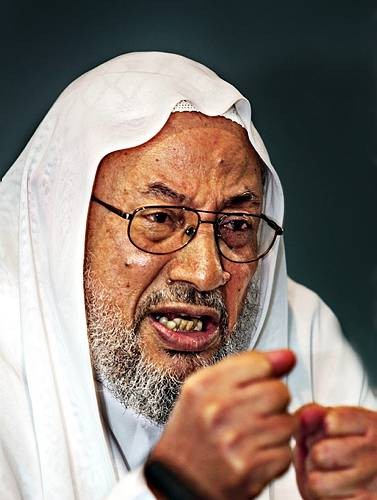
RIYADH, (Reuters) - A leading group of Muslim clerics has called on Sunnis and Shi'ites to desist from efforts to win converts from the other, but blamed Shi'ite Iran for stoking sectarian tensions in Arab countries.
Fears of a growing sectarian rift have bubbled since Iraq's Sunni Muslim leader Saddam Hussein was toppled by U.S.-led forces in 2003 and replaced by a Shi'ite-controlled government backed by Shi'ite power Iran.
Leading Sunni cleric Youssef al-Qaradawi said in remarks to Egyptian and Saudi newspapers last month that Shi'ites now had a voice in traditional Sunni countries like Egypt, Sudan, Tunisia, Algeria and Morocco through proselytisation. He said this could lead to violence.
Qaradawi's comments stirred controversy in Iran where he was attacked in the media and among Shi'ite communities in the Arab world, which are mainly concentrated in Iraq, Lebanon, Saudi Arabia, Kuwait and Bahrain.
The International Union of Muslim Scholars, which met in Qatar this week to discuss the issue, said Iran bore responsibility for "sectarian strife" and urged each sect to respect the other's dominant position in different regions.
"Organised attempts by the minority sect to proselytise in areas where the other is dominant should stop, as part of mutual respect between the sects," it said. "The Islamic Republic of Iran should bear its responsibility to end sectarian strife." Read more ...
Fears of a growing sectarian rift have bubbled since Iraq's Sunni Muslim leader Saddam Hussein was toppled by U.S.-led forces in 2003 and replaced by a Shi'ite-controlled government backed by Shi'ite power Iran.
Leading Sunni cleric Youssef al-Qaradawi said in remarks to Egyptian and Saudi newspapers last month that Shi'ites now had a voice in traditional Sunni countries like Egypt, Sudan, Tunisia, Algeria and Morocco through proselytisation. He said this could lead to violence.
Qaradawi's comments stirred controversy in Iran where he was attacked in the media and among Shi'ite communities in the Arab world, which are mainly concentrated in Iraq, Lebanon, Saudi Arabia, Kuwait and Bahrain.
The International Union of Muslim Scholars, which met in Qatar this week to discuss the issue, said Iran bore responsibility for "sectarian strife" and urged each sect to respect the other's dominant position in different regions.
"Organised attempts by the minority sect to proselytise in areas where the other is dominant should stop, as part of mutual respect between the sects," it said. "The Islamic Republic of Iran should bear its responsibility to end sectarian strife." Read more ...
Source: Reuters
 |




















